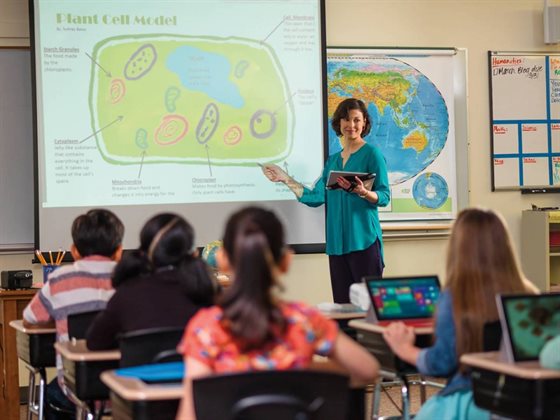Academics invited to speak at a prestigious United Nations education conference are calling on governments, universities and research funders to support a ‘Wikipedia for educators’ to solve the longstanding problem of keeping teachers up to date with the latest research.

Professor Sarah Younie, De Montfort University Leicester (DMU)’s Professor in Education Innovation, and Professor Marilyn Leask, Visiting Professor in Education at DMU, are leading an international network of educators developing the web resource MESH.
MESH, which stands for Mapping Educational Specialist knowhow, is a knowledge mobilisation system giving teachers, policy makers and academics access to the latest thinking and research to guide lesson planning, policy improvements and future research.
Instead of relying solely on intuition to guide what works in the classroom, teachers can read MESH research summaries to find evidence-based approaches that have been proven to remove barriers to learning or indeed to keep up to date in their subject.
Today educators from more than 180 countries use the resource, with a growing community of volunteers contributing who share the same ethos to improve education. MESH has been dubbed ‘Edupedia’ and emerging evidence has shown its benefits in helping support professional judgement.
On Wednesday, Prof Younie and Prof Leask have been invited to present their work to the United Nations Teacher Task Force conference being held in Togo, West Africa.
Prof Younie said: "The MESH network has developed a ‘’Marginal Gains’ strategy which asks education system stakeholders to produce MESH guide research summaries whenever research reports are published. A small change in practice can thus have a significant impact with the research findings made easily available to the millions of teachers worldwide.”
Prof Leask, a teacher, researcher, author, Dean of Education and Government policy officer at DMU and Winchester University, said: "Governments around the world want the best education possible for the coming generations but the cost of keeping each individual teacher up to date in every topic is simply beyond what any one country can afford. The MESH system supports inter-government collaboration and international knowledge sharing supported by digital tools to provide a low cost solution to this longstanding problem.”
Gary Brace, Board Director (Education), UK National Commission for UNESCO is one of many supporters. He said: "Improving quality and equity in education are at the core of SDG4. It follows that we must put emphasis on improving the quality of teachers and teaching.
"A high impact and low cost system of support for teachers is needed if we are to make a global difference to education by 2030. By using available existing technology and drawing on what we already know about what works in teaching, the MESHGuides can both update teachers’ professional knowledge and help improve their practice. If grasped, within a few years the MESHGuides approach could bring a step change to professional support for teachers and, consequently, the quality of education for millions of children."
Other users have also praised the system. Professor Tracey Tokuhama-Espinosa, Quito, Ecuador, said: "UNESCO Latin American fully backs and is enthusiastic about MESH/Conexiones and trusts the quality of the work. MESH is an elegant low cost solution to the long standing problem of keeping teachers up to date.
Professor N.B. Jumani, Islamabad, Pakistan, added: "MESHGuides have the potential to support teachers everywhere in giving lessons which inspire learners."
Improving the quality of education in every country is a UN priority. Some 350 delegates including teachers, educators, teachers’ union representatives, NGOs, researchers, policy makers and those from Teacher Task Force Member States will be attending the UN event in Lome, Togo.
The theme of this year’s forum is Teaching: A Profession, and examines ways to achieve the UN’s stated goal of ensuring inclusive and equitable quality education and promote lifelong learning opportunities for all by 2030.
MESH is a tool of the Educational Futures Collaboration, a registered charity set up for educators and their partners to work to improve the quality of education. Prof Younie and Prof Leask are the co- chairs. In 1995, they co-founded with the Swedish ministry, the successful European SchoolNet which connects teachers and pupils across Europe in undertaking collaborative projects.
Posted on Monday 18 September 2017